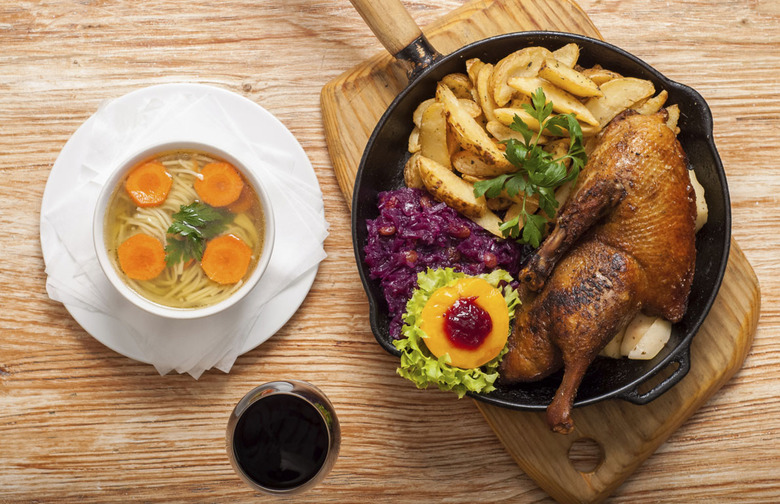Cheese, Chocolate, And Other Foods That Affect Your Dreams
To Eat Perchance to Dream?
The varying ways your body processes certain foods, such as spicy foods that overheat or sugary foods that fatigue, can manifest itself during sleep just as a simple offshoot of all of the neuronal activity that occurs. Because your brain activity is so high during sleep, especially during the rapid eye movement (REM) phase, it is extremely influenced by the digestion process.
When Do We Dream?
When we think back on a night's sleep, some dreams are usually more vivid than others, and many people can barely remember their dreams at all. But we are always dreaming — usually three or four times a night. We dream during several phases of sleep, but most dreams that we remember happen during the rapid eye movement (REM) phase, when the brain is the most active.
Eating Before Bedtime
Shemek recommends avoiding heavy meals within an hour before bed because the stomach needs time to digest. A heavily portioned meal before bedtime can cause indigestion, which may disrupt sleep and instigate dramatic scenarios in dreams — or even nightmares.
Dreaming on an Empty Stomach
Just as falling asleep on a full stomach may cause more colorful dreams, dozing off on an empty stomach, which may result in low blood sugar, can have a similar effect. In a 2007 study, low blood sugar in patients with type 1 diabetes was found to be a direct cause of bad dreams and night sweats.
Cheese
Just a small square of cheese before bed is enough to promote peaceful dreams. A study by the British Cheese Board found that three-quarters of volunteers who ate two-thirds of an ounce of cheese about 30 minutes before falling asleep reported having pleasant dreams.
Chocolate
Eating sugary treats less than an hour before bed isn't a good idea, according to Shemek. All that sugar might keep you up, for one, and the body needs time to metabolize it. Chocolate, in particular, contains compounds that are known to have psychoactive effects on the brain, causing enhanced dreams — good and bad. One of these compounds, an amino acid called tyramine, produces adrenaline in the body, increasing blood pressure and heart rate — both conditions known to disrupt dreams. Additionally, the high fat content in chocolate and other sugary foods can release molecules that produce a feeling of euphoria.
Fatty Foods
The body needs time to digest, especially when we consume high-fat foods like burgers and potato chips. Falling asleep before the body is able to process fatty foods can lead to indigestion, which may disturb your sleep and cause very vivid dreams and even nightmares.
Foods High in Tryptophan and Vitamin B6
For a good night's rest, eating foods rich in the amino acid tryptophan and Vitamin B6, such as turkey and fish, is the way to go: both tryptophan and B6 are calming and can promote good dreams. But beware: these types of foods are also linked with better dream recall and dream intensity, which could bring on nightmares. Shemek suggests eating meals high in carbohydrates before bed. She says they can combat amino acids like tryptophan, making them non-threatening and easily absorbed by the body.
Milk
It's believed that drinking milk — which contains melatonin, a hormone that helps regulate sleep patterns — before bed promotes good dreams. Melatonin is known to induce a longer sleep as well as longer dreams during REM.
Nutmeg
Spices consumed in small quantities most likely won't meddle in your dreams, but when spices are mixed and consumed in large amounts your dreams could become eccentric. Nutmeg, for instance, contains a compound called myristicin, which the body converts into a chemical called MMDA, related to MDMA (better known as Ecstasy). Just a little bit of nutmeg probably won't give you strange dreams, but beware of spicy Indian dishes before bedtime.
Spicy Foods
Spicy foods don't just set your tongue on fire. Condiments like Tabasco sauce and hot mustard are known to overheat the body, sending it into cool-down mode, during which the body uses a ton of energy to metabolize what you just ate. If you don't eat spicy foods very often, you may find yourself dreaming up some bizarre narratives. On the other hand, if you've been eating spicy foods all your life and have developed a tolerance, you probably won't be affected as much — if at all — because your body has learned to adjust.











